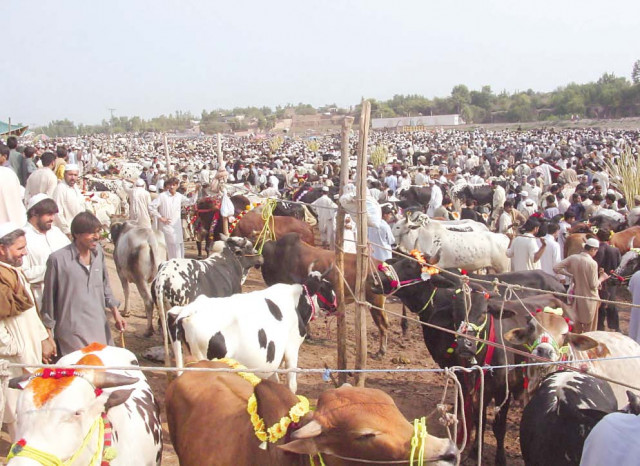Minister orders to spray animals entering Sindh
Campaigns also ordered to create awareness

A view of a jam-packed cattle market. PHOTO: ABDUL GHAFFAR/EXPRESS
While chairing a meeting at her office, she directed all the stakeholders, including officials from the livestock department and Karachi Metropolitan Corporation (KMC), to take necessary precautionary measures. Additional Chief Secretary Dr Usman Chachar and General Health Director Dr Mobeen were also present at the meeting.
She directed the Karachi Health Director to keep records of all Congo virus related cases and submit a report daily to the data surveillance cell so that the situation could be assessed. She also ordered to keep the record of 12 other diseases to initiate the awareness campaigns.
Dr Pechuho directed the livestock officials and slaughter house workers to take precautionary measures while handling animals by initiating sprays and directed the programme manager for dengue to initiate campaign to control dengue in the province.
Currently, four out of 12 patients admitted at Jinnah Postgraduate Medical Center (JPMC) died after Eidul Azha, confirmed JPMC Executive Director Dr Seemin Jamali. Moreover, three patients are still under treatment at the isolation ward facility of the hospital. She added that there are patients coming in from Balochistan and Southern Punjab as well.
Export of animals as 'gifts' challenged
Dr Jamali said that the viral disease is highly contagious and has a high mortality rate, which can be spread through the bite of a 'tick' present on wild and domestic animals such as cattle, goats, sheep and hares.
In the current year, 55 cases of Congo fever were reported at Aga Khan University Hospital for either treatment or testing; of which the majority came in from Balochistan while others from Khyber Pakhtunkhwa and Punjab.
Six cases of Congo fever in this year, which came in from Sindh, resulted in deaths, said the focal person for Congo Prevention, Dr Syed Zafar Mehdi, due to frequent exposure of people with the sacrificial animals.
"The animals serve as amplifying hosts for the virus or it contacts with wounds and abraded skin of handlers," explained Dr Mehdi, adding that transmission of Congo virus to humans occurs through contact with infected ticks of animal or human blood.
He added that the virus is so contagious that it can be transmitted from one infected human to another by contact with infectious blood or body fluids, and can infect medical care providers due to improper sterilisation of medical equipment, re-use of injection needles and contamination of blood supplies.
However, he said it can be avoided if the public and animal handlers use personal protective measures like appropriate clothing and gloves during handling and butchering of animals. According to Dr Mehdi, anti-tick repellants could help not to acquire Congo virus and the animals must be sprayed with or dipped into water having acaricide, cypermetherin, etc and later use insecticide chemicals to decontaminate the animal's offal and waste to control the spread of virus.
Published in The Express Tribune, September 5th, 2018.



















COMMENTS
Comments are moderated and generally will be posted if they are on-topic and not abusive.
For more information, please see our Comments FAQ